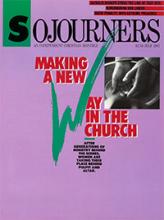DARK AND HEAVY CLOUDS SHORTENED the horizon. The stalks of sugar cane swayed back and forth in rhythm with the roaring winds as the people hurriedly took shelter in the only storm-proof structures in the town--the school buildings. Hurricane San Felipe was paying a visit to Puerto Rico with the intention of sweeping it clean.
At the shelter where we were, most of the children were crying, some of the mothers were telling tall and scary stories, and the men were gambling with cards and dominoes. A small group of church-women were praying. This is the first memory of my existence, and in this setting, I am told, I gave my first testimony to the power of Jesus Christ.
I was very little, and in baby talk I prayed: "Jesus, Son of David, have mercy on me." I repeated the memorized prayer again and again, and the men stopped their gambling to listen and shamefully echoed the prayer. We all survived the hurricane, although we lost our houses.
I thank God for giving me the blessing of being born of Christian parents. My mother, although she could not read or write, taught me everything she had memorized as others read to her and taught me to depend on Jesus, not being ashamed to proclaim and exalt his holy name.
As I grew up, the words and prayers of salvation and hope that were once repeated as a toddler now were used more structurally to bring the gospel to passers-by on street corners, beaches, and in parks. The fact that I was a child, and a female at that, did not take from the power of the message, and young and old, men and women, listened and responded. As I recall, I did not experience any rejection then.
Read the Full Article

